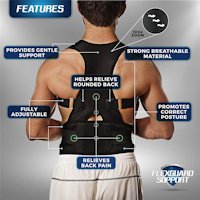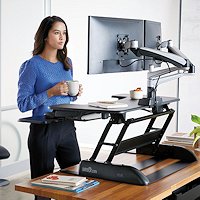Back Pain Disability Risk Increases For Workaholics
Low back pain is a major health issue and a significant cause of disability and related work related loss, having financial as well as social impacts and now workaholics of those with an obsessive working disorder.
Most individuals have a low grade type of back pain with minimal impact on disability, however, some will go on to develop chronic back pain that is disabling. Low back pain is a major cause of having to live with a disabling condition and is one of the major specific causes associated with years spent living with less than ideal health.
Chronic or long term back pain has associated costs which far exceed those associated with acute or recent episode of back pain. A 2013 cross sectional study in the journal Public Library of Science One sheds some light on the relationship between disabling back pain and workaholics. According to the study, they have a significantly increased risk of suffering disabling back pain.
Problems With Workaholics & Back Pain
 An obsessive working disorder individual has a propensity to work excessively hard along with an obsession thinking about work, resulting in compulsive working. They will spend a lot of time on activities associated with work, even when not required to do so. This has an impact on family life, recreational activities as well as social events. Even when not at work, they are persistent in regarding thinking about work and will work above and beyond what is necessary for his or her job requirements, as well as beyond what is reasonably required to meet basic economic needs.
An obsessive working disorder individual has a propensity to work excessively hard along with an obsession thinking about work, resulting in compulsive working. They will spend a lot of time on activities associated with work, even when not required to do so. This has an impact on family life, recreational activities as well as social events. Even when not at work, they are persistent in regarding thinking about work and will work above and beyond what is necessary for his or her job requirements, as well as beyond what is reasonably required to meet basic economic needs.
In addition to a significant increase in back pain, having an obsessive working disorder, one can expect to have more psychological problems. This can be in the form of mental distress, poor emotional well being, fatigue or exhaustion and will encounter more sleeping difficulties. Because a workaholic spends excessive amounts of time working, they may not have adequate time to recover from this effort. In time, this situation can bring about emotional exhaustion.
Thinking about work frequently and persistently may also cause anxiety, in addition to and complicating the emotional distress. Furthermore, a workaholic will often show a tendency for a displaying a high level of perfectionism, along with being unwilling delegate working tasks to others. This can significantly affect working in a team effort and can result in hostile relationships with other workers. Therefore, besides an increase risk of back pain disability, having a obsessive working disorder may not only affect your quality of life and economic circumstances, but those of others and contribute to mental health issues.
According to this interesting study, the higher the level of workaholic tendencies, the more disabling back pain is observed; with high level workaholics exhibiting almost 2 and a half times the disabling back pain than those with lower working tendencies. The study indicates that a workaholic has a greater risk of disabling back pain, as well as poor mental health and an increased incidence of sickness absence.
This study gives some clues regarding what seems to be termed “obsessive working disorder” and how it is related to back pain disability, psychological health as well as increases in sickness leave. Does working too hard cause less productivity and ultimately have a negative impact on others, as well as society in general? This new study would seem to indicate concerns in the workplace which may be addressed to improve overall work productivity and health.

 Supports & Cushions
Supports & Cushions Posture Braces
Posture Braces Ergonomic Aids
Ergonomic Aids